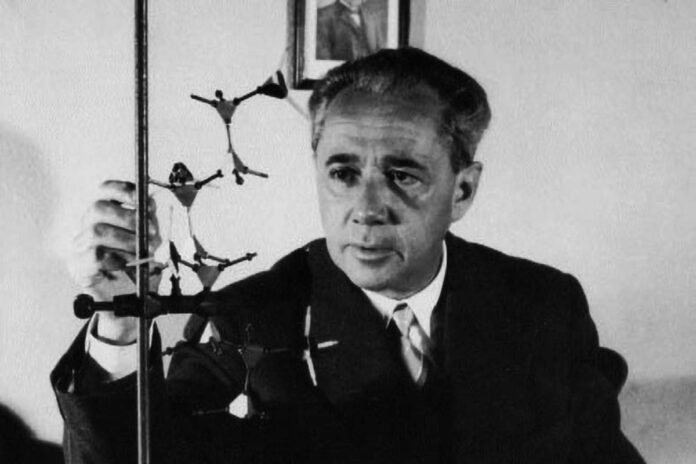Giulio Natta: February 26, 1903 – May 2, 1979) was an Italian chemical engineer and Nobel laureate. He was awarded the Nobel Prize in Chemistry in 1963, shared with Karl Ziegler, for their groundbreaking work on high-density polymers. In 1969, Natta also received the prestigious Lomonosov Gold Medal in recognition of his contributions to the field.
Introduction
Giulio Natta, an Italian chemist whose work has profoundly impacted the world of science, is best known for his discovery of stereospecific polymerization. His innovations in polymer chemistry revolutionized the plastic industry and earned him the Nobel Prize in Chemistry. Natta’s work not only transformed chemistry but also paved the way for countless advancements in materials science, making everyday products more efficient and affordable. In this article, we’ll explore his life, contributions, and the enduring legacy he left on the field of polymer science.
Early Life and Education
A Passion for Chemistry
Giulio Natta was born on February 26, 1903, in Imperia, Italy. From a young age, he demonstrated an aptitude for science, particularly chemistry. His journey into the world of chemistry began at the University of Milan, where he earned a degree in chemical engineering. Natta’s passion for the subject grew during his postgraduate studies, where he began to develop an interest in the emerging field of polymers.
The Path to Polymer Chemistry
While working in Milan, Natta was introduced to the work of other leading chemists, such as Karl Ziegler, whose pioneering studies in polymer chemistry would later inspire Natta’s own breakthroughs. During the 1930s, polymer chemistry was still in its infancy, and Natta’s work helped solidify the discipline as one of the most important fields of modern science.
Giulio Natta’s Major Contribution: Stereospecific Polymerization
What is Stereospecific Polymerization?
One of Natta’s most significant contributions to chemistry was his work on stereospecific polymerization. This process allows for the creation of highly structured polymers with specific properties. Before Natta’s discoveries, polymers were often irregular and lacked consistent properties. Stereospecific polymerization, however, allowed for the controlled arrangement of polymer chains, leading to materials with predictable, enhanced characteristics.
The Collaboration with Ziegler
Giulio Natta’s work on stereospecific polymerization was done in collaboration with German chemist Karl Ziegler. Together, the two scientists developed a catalyst system that enabled the polymerization of propylene into isotactic polypropylene, a breakthrough that allowed for the creation of stronger, more durable plastics. For this achievement, Natta and Ziegler were awarded the Nobel Prize in Chemistry in 1963.
Impact on Industry and Technology
Revolutionizing the Plastic Industry
Natta’s discoveries had far-reaching consequences for the plastic industry. Prior to his work, plastic production was limited in scope and quality. With the advent of stereospecific polymerization, Natta made it possible to produce polymers that were not only stronger but also more versatile. This opened the door to a wide array of applications, from household goods to medical equipment and automotive components.
Advancements in Materials Science
Natta’s work did not stop with polypropylene. His innovations in polymer chemistry laid the foundation for the development of a broad range of synthetic materials used across industries today. His research on catalytic processes for polymerization continues to influence the development of new materials that are lighter, stronger, and more durable than ever before.
Giulio Natta’s Legacy
A Lasting Impact on Science
Giulio Natta’s work changed the landscape of polymer chemistry forever. His Nobel Prize-winning research continues to be a cornerstone in the study of polymers, influencing scientists and engineers worldwide. Even decades after his passing, Natta’s influence remains present in modern-day innovations in materials science, from biodegradable plastics to high-performance polymers used in cutting-edge technologies like electronics and aerospace.
Recognition and Honors
Natta’s groundbreaking work has been widely recognized, not only with the Nobel Prize but also through numerous awards and honors. He was a member of the Italian Academy of Sciences and held several prestigious academic positions throughout his career. His scientific achievements have made him a role model for future generations of chemists.
FAQ Section
What did Giulio Natta discover?
Giulio Natta is best known for his development of stereospecific polymerization, a method that enables the creation of highly structured and durable polymers. This discovery revolutionized the plastic industry.
How did Giulio Natta influence the polymer industry?
Natta’s work allowed for the mass production of stronger, more versatile plastics such as polypropylene. His research helped shape the modern plastic industry, leading to advancements in packaging, automotive, and medical fields.
What did Natta win the Nobel Prize for?
Giulio Natta shared the Nobel Prize in Chemistry in 1963 with Karl Ziegler for their work on the development of catalysts used in the polymerization of olefins, which revolutionized the production of plastics.
Final Thoughts: Giulio Natta’s Enduring Legacy
Giulio Natta’s contributions to polymer chemistry have left an indelible mark on both science and industry. His discoveries laid the foundation for the modern plastics industry, making products more durable, affordable, and versatile. Natta’s work not only advanced the field of chemistry but also improved the lives of people around the world. As we continue to innovate in material science, his legacy serves as a constant reminder of the power of scientific discovery and its potential to shape the future.




